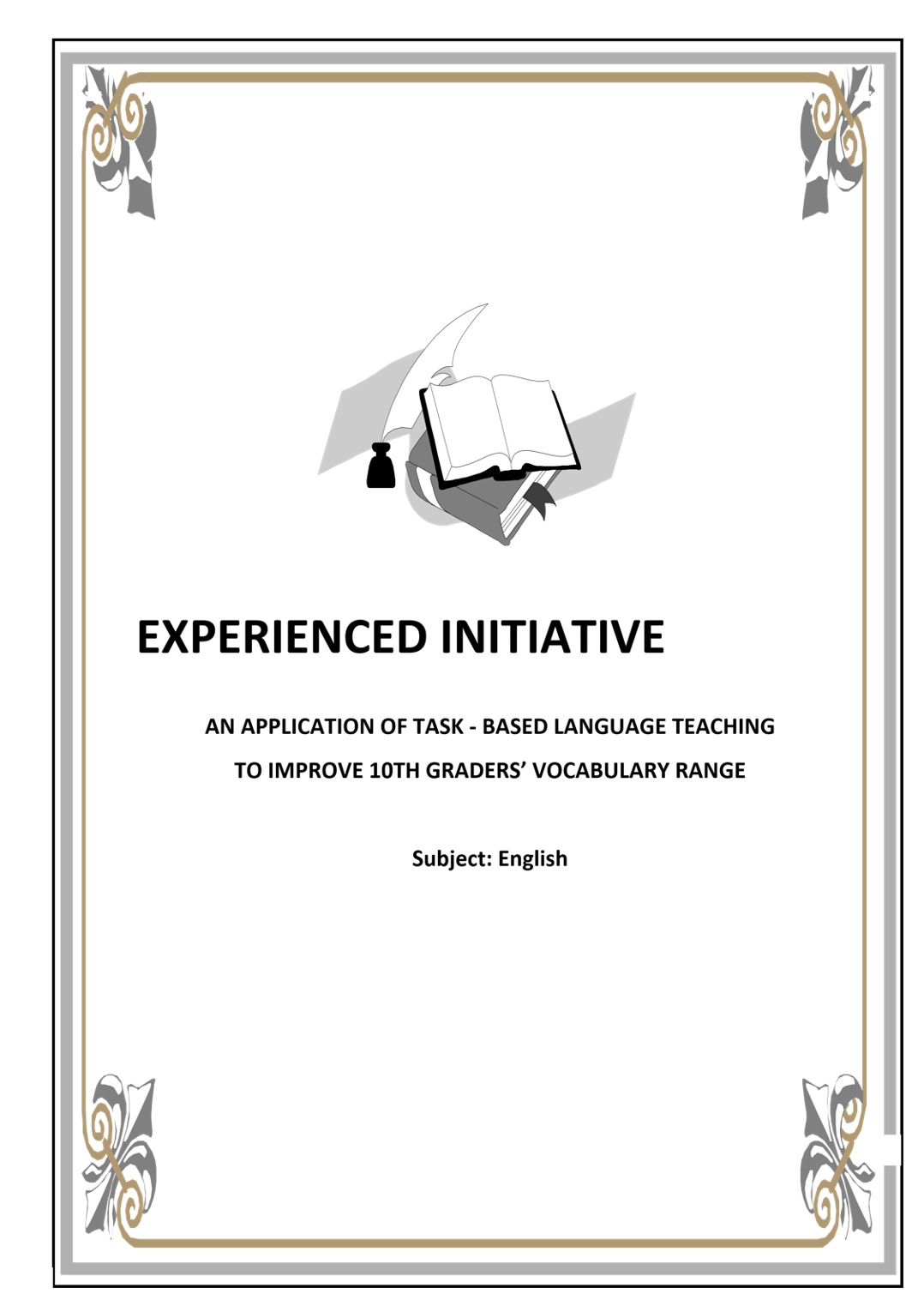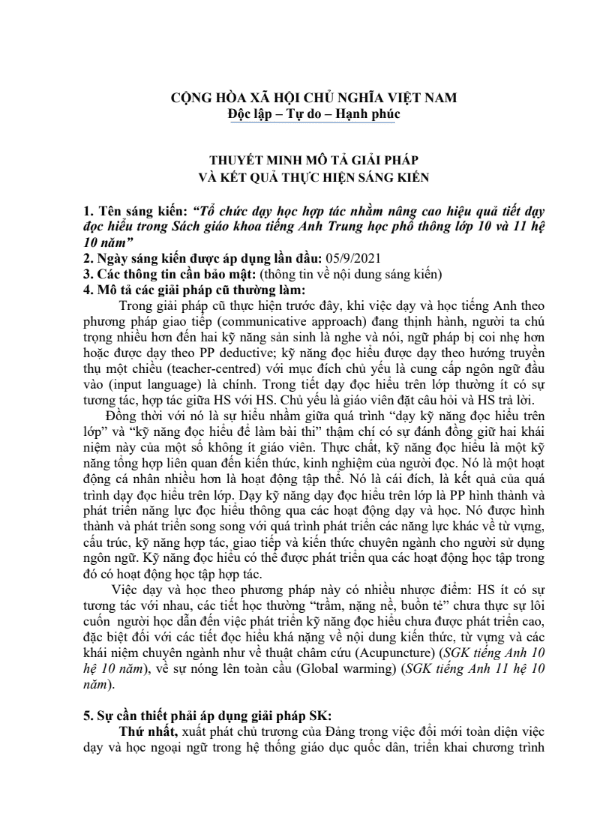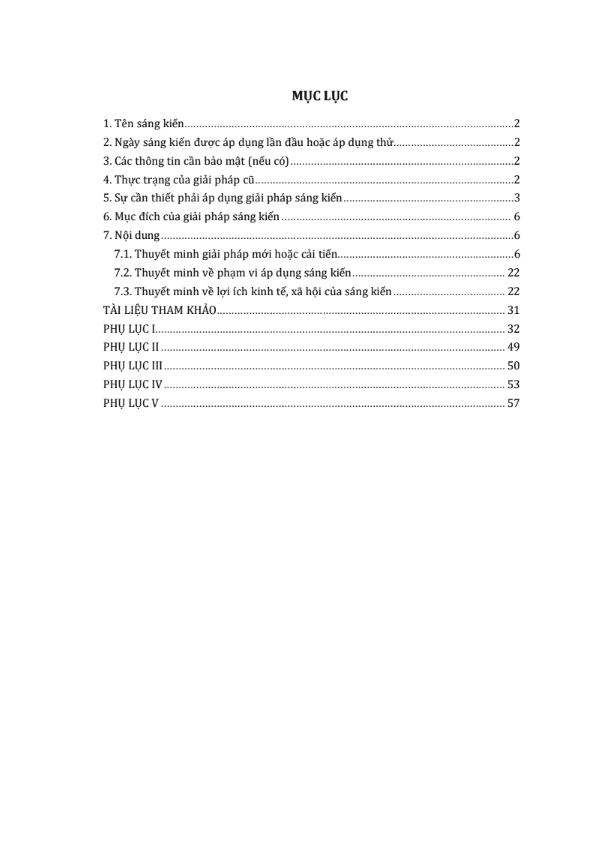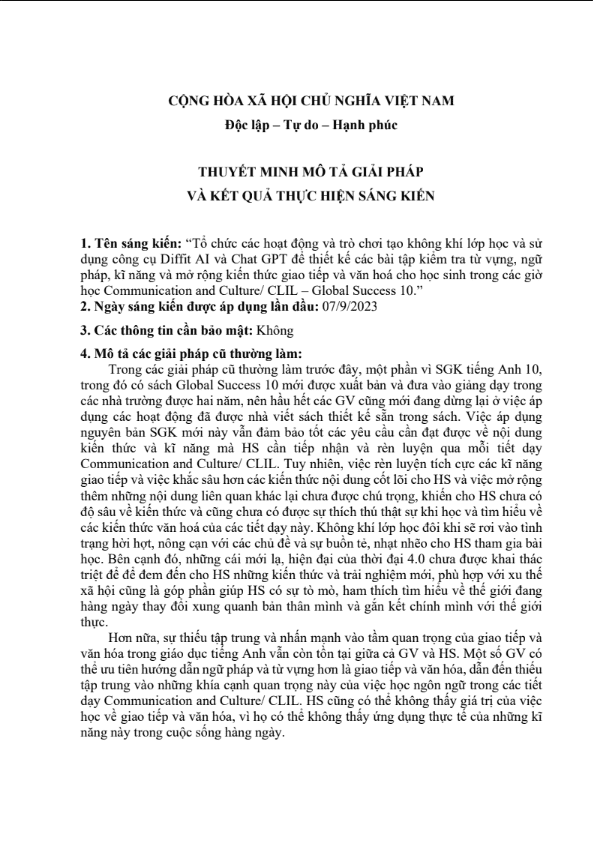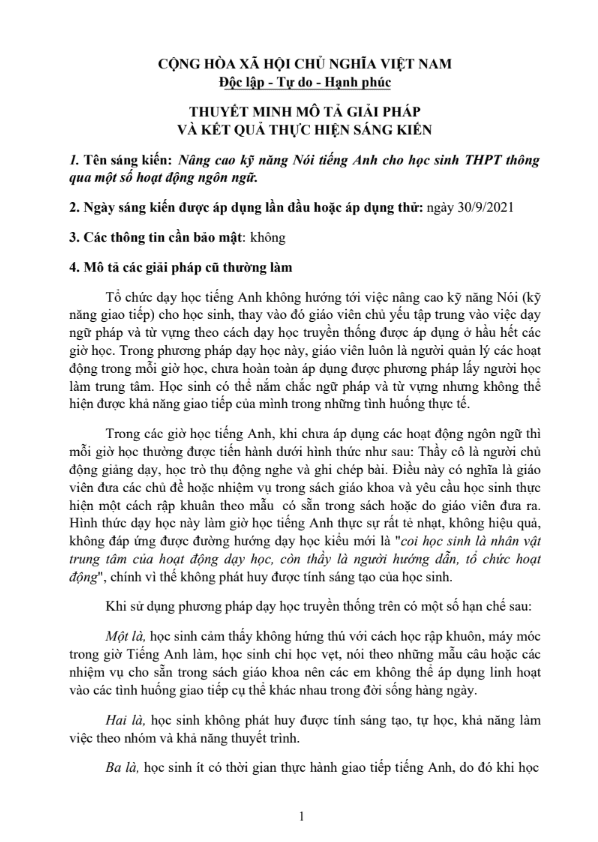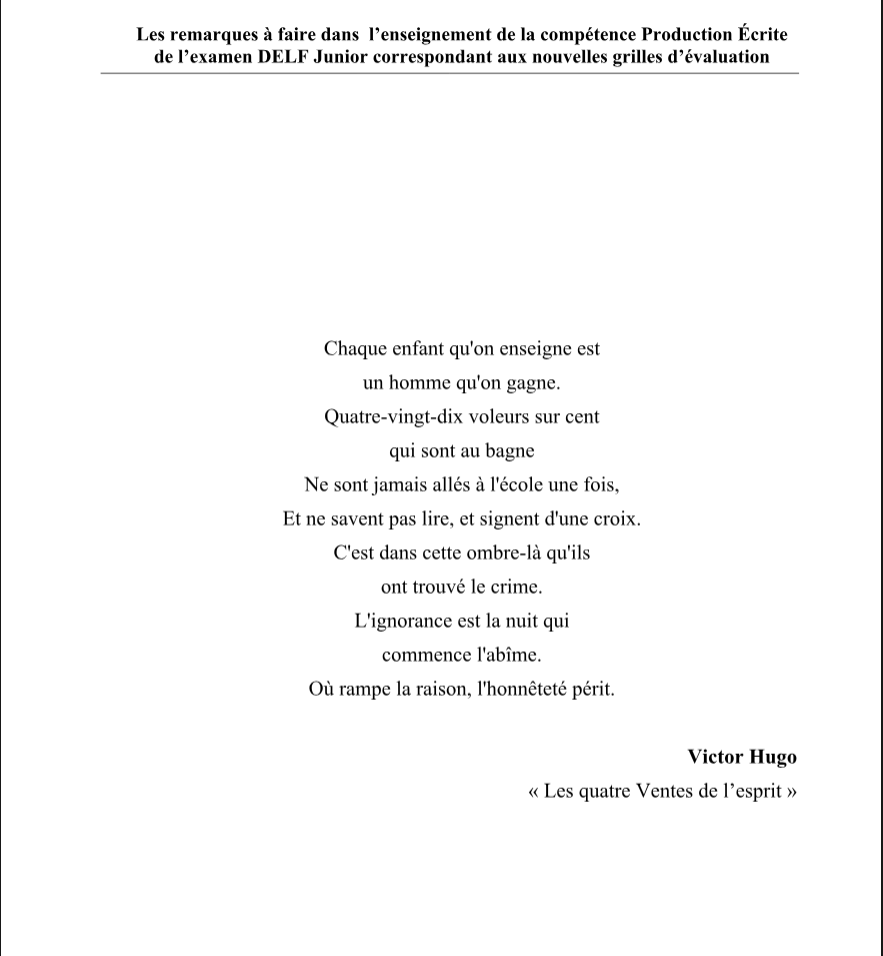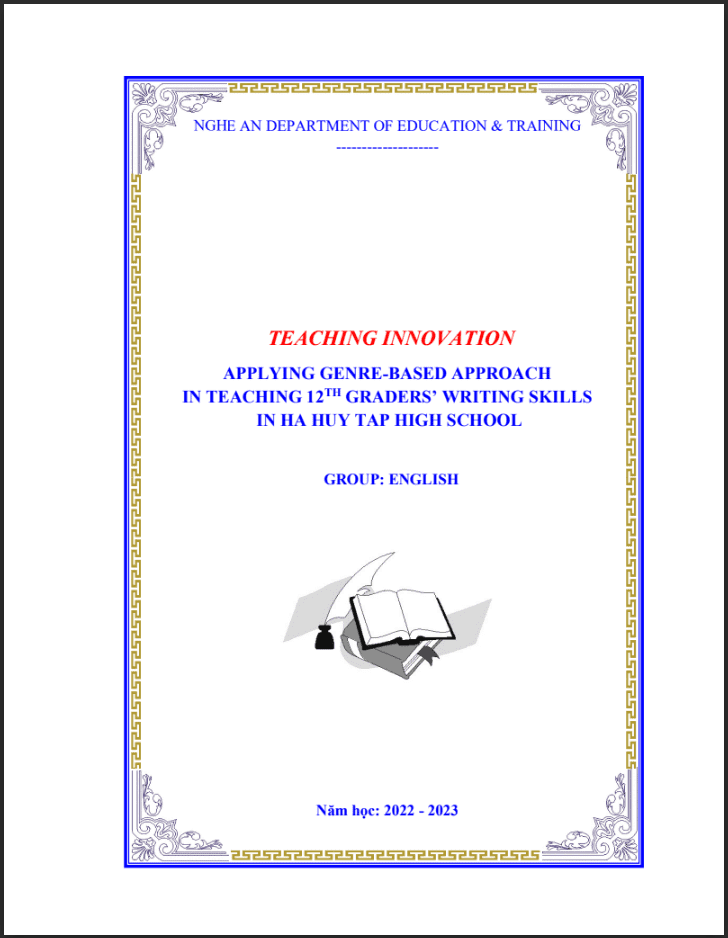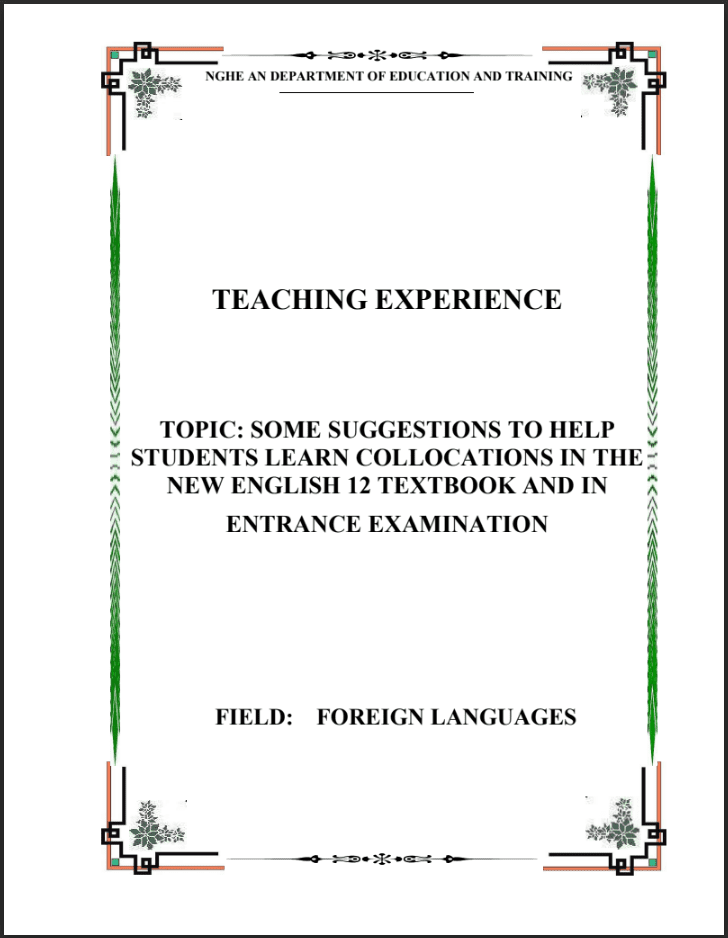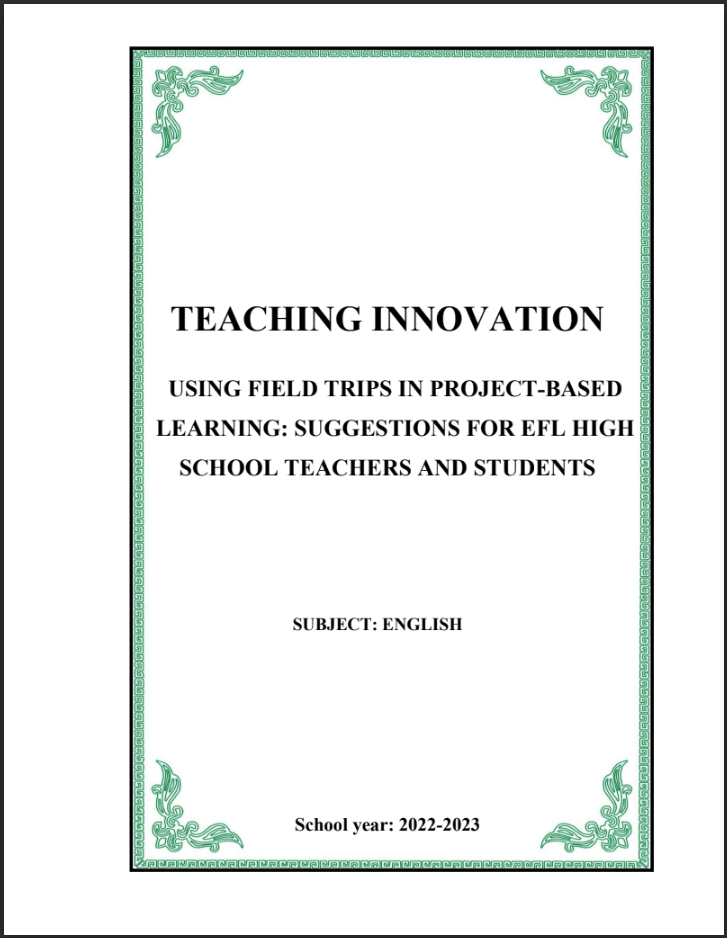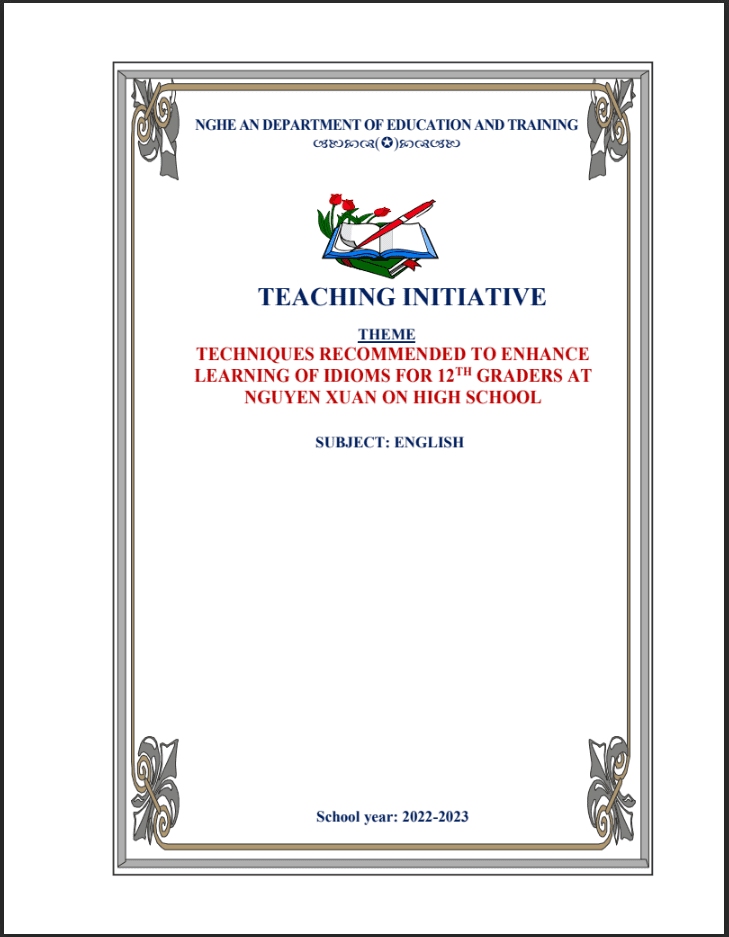SKKN An application of task – based language teaching to improve 10th graders’ vocabulary range
- Mã tài liệu: MP0006 Copy
| Môn: | Tiếng anh |
| Lớp: | 10 |
| Bộ sách: | |
| Lượt xem: | 807 |
| Lượt tải: | 9 |
| Số trang: | 43 |
| Tác giả: | Nguyễn Thị Lan |
| Trình độ chuyên môn: | Thạc sĩ giáo dục |
| Đơn vị công tác: | THPT Quỳ Hợp 3 |
| Năm viết: | 2021-2022 |
| Số trang: | 43 |
| Tác giả: | Nguyễn Thị Lan |
| Trình độ chuyên môn: | Thạc sĩ giáo dục |
| Đơn vị công tác: | THPT Quỳ Hợp 3 |
| Năm viết: | 2021-2022 |
Sáng kiến kinh nghiệm “SKKN An application of task – based language teaching to improve 10th graders’ vocabulary range” triển khai gồm các biện pháp nổi bật sau:
– Procedure for a task-based activity
– Sample of application of task – based language teaching
Mô tả sản phẩm
TABLE OF CONTENTS
PART I. INTRODUCTION ………………………………………………………………………….. 1
- Rationale …………………………………………………………………………………………. 1
- Objectives …………………………………………………………………………………………. 2
- Scope of the study ……………………………………………………………………………… 2
- Research Methods ………………………………………………………………………………. 2
PART II. CONTENT …………………………………………………………………………………… 3
- Theoretical and practical background ……………………………………………………. 3
- Theoretical background ……………………………………………………………………… 3
- Practical background: ………………………………………………………………………… 6
- The solutions: …………………………………………………………………………………….. 7
- Procedure for a task-based activity: …………………………………………………….. 7
- Sample of application of task – based language teaching: ………………………. 7
PART III: CONCLUSION …………………………………………………………………………. 28
- Results of the experiment ………………………………………………………………….. 28
- Applicabilities of the experiments: ……………………………………………………… 29 PREFERENCE …………………………………………………………………………………………. 30 APPENDIX 1: PRE TEST AND POST TEST ……………………………………………… 31 APPENDIX 2 – QUESTIONNAIRE ……………………………………………………………. 37 QUESTIONAIRE ITEMS ………………………………………………………………………….. 37
PART I. INTRODUCTION
1. Rationale
In acquiring a foreign language, vocabulary plays a crucial part. It is one element that links the four skills (speaking, listening, reading and writing) all together. Talking about the importance of vocabulary, the linguist David Wilkins. D. A. (1972) argued that: “without grammar little can be conveyed, without vocabulary nothing can be conveyed”. Indeed, people need to use words in order to express themselves in any language. In order to communicate well in a foreign language, anyone should acquire an adequate number of words and should know how to use them accurately.
Before 1970, little attention was paid to vocabulary teaching and learning. It means that teaching vocabulary was just considered an addition to teaching grammar or simply a by-product of language teaching and communicative functions. Those four traditional skills don’t take into account the other skills necessary for language development. However, some scholars of language acquisition no longer talk about the four language skills, but nine skills. These other five skills are vocabulary, spelling, grammar, pronunciation and study skills. Therefore, the role of vocabulary knowledge has been recognized by theorists and researchers since 1990.
Besides, in my experience as a teacher of English, I noticed that my students usually find it difficult to speak English fluently. They usually consider speaking and writing activities (productive skills) exhausting because they keep on using the same words and expressions, so very soon their conversation is abruptly interrupted due to missing words. For the same reason, their receptive skills: listening and reading are not good either. The main reason for such problems is the lack of vocabulary. Other students are faced with the problem of forgetting the words right after the teacher has elicited their meaning or after having looked them in the dictionary. This is also a cause of the lack of vocabulary.
In the context of our contemporary society that are being affected considerably by the COVID-19 Pandemic, the demand for both teachers and students to have a novel and efficient method of teaching and learning is more necessary than ever. Both students and teachers need a learning method that is applicable and easy to implement due to the geographical and economic situation of students in the local area where the researcher carries out the research. As a matter of fact, the task-based language teaching method will be chosen for this thesis paper.
Recognizing the importance of vocabulary, I myself understand that the teacher has an essential role in helping students to improve their vocabulary. Therefore, being a teacher of English, I would like to recommend my experience: “An application of task – based language teaching to improve 10th graders’ vocabulary range”. I hope that my ideas and my effort can be a useful solution to teach vocabulary.
2. Objectives
The objectives of the study are to research the effectiveness of the task-based learning method in improving students’ vocabulary and also find out their opinions in learning vocabulary and the relationship between the use of vocabulary learning strategies and the application of task-based learning method.
3. Scope of the study
10th students at Quy Hop 3 high school
4. Research Methods
To achieve the objectives of the study, both qualitative and quantitative methods will be exploited in this action research. Before the experiment, forty students from class 10 C1 were designated as control groups and forty students from class 10 A1 were experimental groups. All of them have learnt English for at least seven years at school. Despite the fact that there might be some inevitable variables such as intelligence and characteristics among students, the differences between the two groups were limited to a minimum. The study was carried out to explore the effectiveness of the technique for teaching on students.
PART II. CONTENT
I. Theoretical and practical background
1. Theoretical background
1.1. Vocabulary
Vocabulary is an essential building block of language because it is the element that links the four skills of vocabulary, listening, reading and writing all together. In order to overcome the challenges of specialized usage of vocabulary, learners need to be taught and learn about the definition and different types of vocabulary, their usage, and specific methods that will help them acquire vocabulary
1.1.1 Definition of vocabulary
Vocabulary is an important and necessary aspect of language. To master a language, learners should have a thorough grasp of the vocabulary of the language. This means that learners cannot use a language without having knowledge about the vocabulary of that language. There have been many different definitions of vocabulary. According to Pyles and Algae (1970), when people think about language, they think just about words. They assert that “the vocabulary is the focus of language. It is in words that we arrange together to make sentences, conversation and discourse of all kinds” Ur (1996, p.60) also noted that “vocabulary is the words we teach in the foreign language. However, a new item of vocabulary may be more than a single word: a compound of two or three words or multi- word idioms”. Joklova (2009) stated that vocabulary is a list of words and their combination in particular language. Vocabulary learning is important because it is needed by learners to acquire a lot of words so they can use the vocabulary in any needs especially academic needs (Komachali & Khodareza, 2012). Vocabulary learning can be applied in classroom activities by teachers by considering the level of language proficiency of the students so successful and effective vocabulary learning can be reached. The word “vocabulary” came from the Latin word “vocabulum” which means “name”. It has come to English since 16th century. In the Macmillan English Dictionary, the word “vocabulary” means “all the words in a particular language”. Each linguist gives his own definition. Lewis (1993, p.89) states that “vocabulary may be individual words or full sentences-institutionalized utterances that convey fixed social or pragmatic meaning within a given community”. It can be concluded that vocabulary is words are useful in all skills in English, even in productive and receptive forms. It shows that vocabulary is the key to achieve all skills and it the basic unit in a language.
To summarize, vocabulary is the total number of all the words that a language possesses including single words, two or three words items expressing single idea
TÀI LIỆU LIÊN QUAN
- 7
- 105
- 1
- [product_views]
- 5
- 173
- 2
- [product_views]
- 4
- 165
- 3
- [product_views]
- 4
- 129
- 4
- [product_views]
100.000 ₫
- 6
- 434
- 5
- [product_views]
100.000 ₫
- 2
- 507
- 6
- [product_views]
100.000 ₫
- 9
- 546
- 7
- [product_views]
100.000 ₫
- 4
- 409
- 8
- [product_views]
100.000 ₫
- 2
- 595
- 9
- [product_views]
100.000 ₫
- 0
- 538
- 10
- [product_views]

